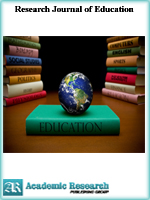Research Journal of Education
Online ISSN: 2413-0540
Print ISSN: 2413-8886
Print ISSN: 2413-8886
Quarterly Published (4 Issues Per Year)

Archives
Volume 9 Number 3 September 2023
Exploring Advanced Placement Research Course: Student Perspectives, Advantages, and Obstacles
Authors: Omar Al Noursi
Pages: 41-51
DOI: doi.org/10.32861/rje.93.41.51
Abstract
This study examines the efficacy, benefits, and concerns of high school students in the 2021-2022 AP Research course. It assesses their satisfaction with course materials and methods, utilizing surveys and essays for data collection. The findings reveal that, despite challenges, most students improved and were satisfied with the teacher’s pedagogy. These results enhance our understanding of AP Research’s effectiveness and impact on student engagement. Further research is required to optimize student experiences and outcomes in the program.
The Application Status, Principles and Strategies of Situation Creation in High School Biology
Authors: Bo Peng ; Zhuanqing Yang ; Quanxiu Wang, et. al.
Pages: 23-40
DOI: doi.org/10.32861/rje.23.40
Abstract
The "General High School Biology Curriculum Standards (2017 Edition, 2020 Revision)" requires teachers to learn to use real-life materials for teaching, to present the curriculum content in a situational manner, and to lay a solid foundation for students’ lifelong development. By investigating the current application of scenario creation in high school biology classroom teaching, it was found that teachers have a one-sided understanding of scenario creation and there are misconceptions in their teaching use. Students’ learning methods are not flexible enough, their autonomous learning ability is weak, and classroom learning efficiency is low. Therefore, teachers should follow the principles of objectivity, authenticity, emotion, and development when creating situations. Teachers can use pictures, videos, life phenomena, explore practice, and create scenarios through research cases. This article analyzes the current application status of scenario creation and develops a set of principles and strategies for scenario creation, which can provide reference and inspiration for biology teachers in frontline high schools.
Teachers’ Capacity Building Strategies and Pupils’ Academic Performance in Muslim Public Primary Schools in Namutumba District of Uganda
Authors: Muhammad Abubakar Ndagi ; Nafiu Lukman Abiodun ; Mirembe Rebecca
Pages: 15-22
DOI: doi.org/10.32861/rje.93.15.22
Abstract
The study examined the effect of teachers’ capacity building strategies on the pupils’ academic performance in muslim public primary schools in Namutumba district, Uganda. The specific objectives were to: establish the effect of in service training strategies on pupils’ academic performance; find out the influence of teachers’ collaboration on pupils’; and ascertain the influence of teacher’s mentoring on pupils’ academic performance in muslim funded public primary schools in Namutumba District. The study employed a descriptive survey design. Cluster sampling method was employed to select one hundred and thirty four (134) teachers from the schools for the study, while census was used to select the DEO and the ten (10) Head teachers. The study used questionnaire and structured interview guide to collect the data. The value of CVI obtained was 0.78 while the values of reliability obtained were 0.767, 0.755 and 0.787 for in- service training, collaboration and mentoring respectively, which indicates that the questionnaire items were relevant and suitable. One hundred and thirty four (134) questionnaires were administered while a total of ninety eight (98) teachers returned giving a return rate of 73.1%. The data was analyzed using both quantitative and qualitative analysis approaches. The quantitative data were descriptively and inferentially analyzed. Frequencies and percentages were used and Pearson Product Moment correlation statistics was used to establish the level of the relationship. On the other hand, the qualitative data were thematically analyzed using data collected from interviewing the head teachers and DEO. Majority 54.1% of the teachers were males, majority 57.1% of the teachers were below 38 years, and overwhelming majority 92.8% of the teachers did not hold University degree. The study concluded that teachers’ in-service training, teachers’ collaboration in teaching and teachers’ coaching strategy improves the pupils’ academic performance in Muslim primary schools in Namutumba district. Finally, the study recommended that government should hold in-service training to include themes on professional skills and subject matter to enable all teachers benefit and be able to help learners improve in their performance; school administration should setup academic committees in schools where teachers discuss learners’ challenges and ways of helping learners improve; and school management should identify the teachers’ competencies in their teaching areas and assign them responsibilities of coaching other teachers.



